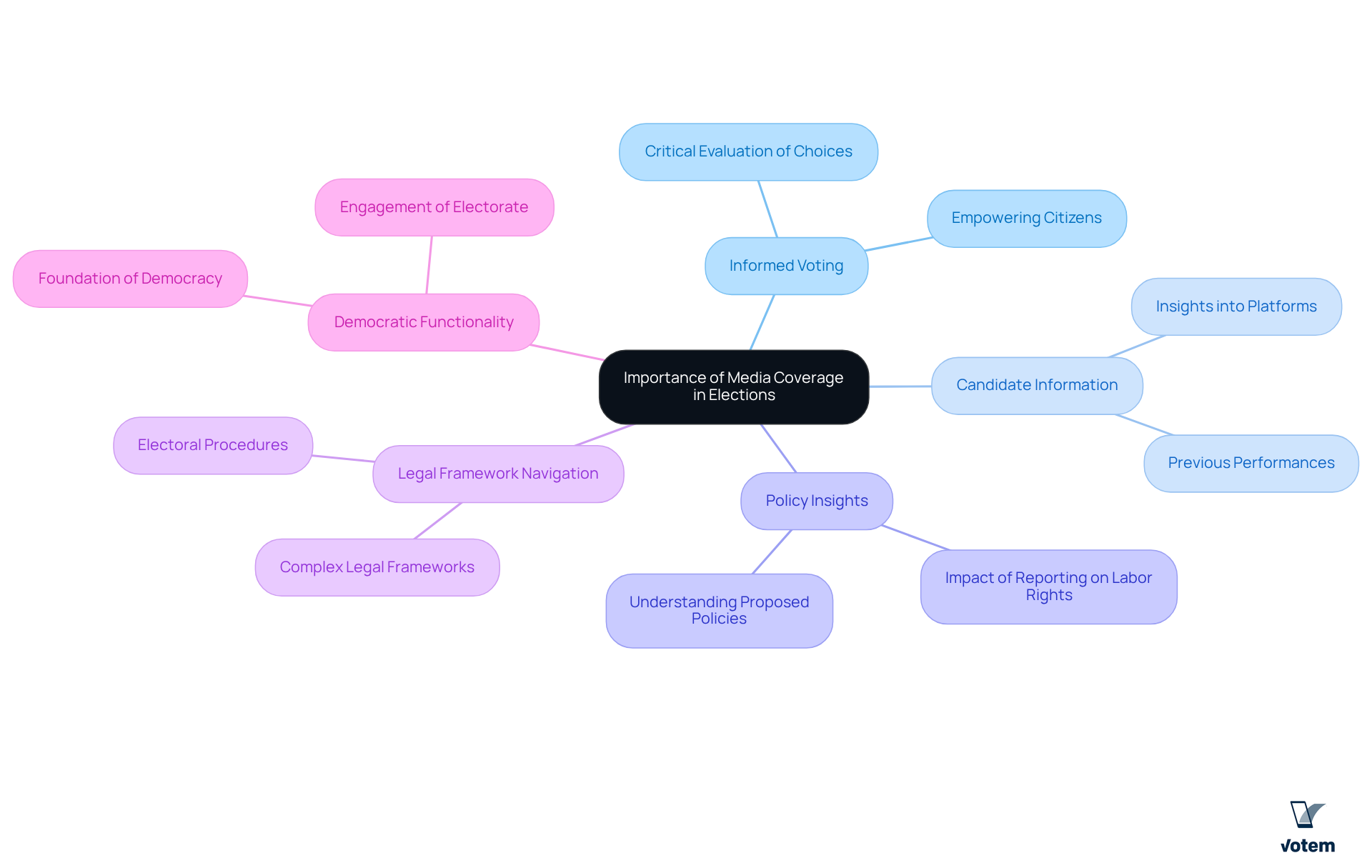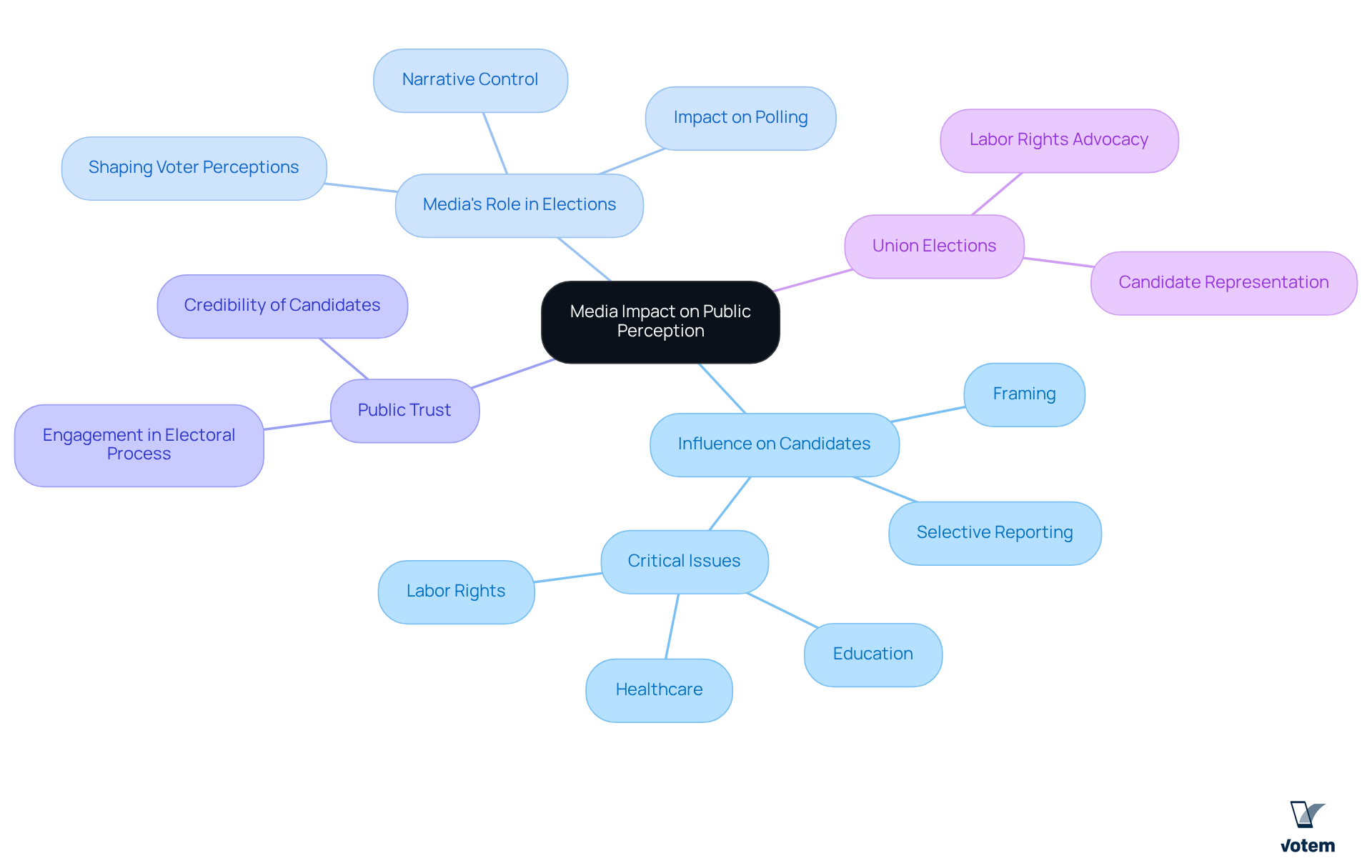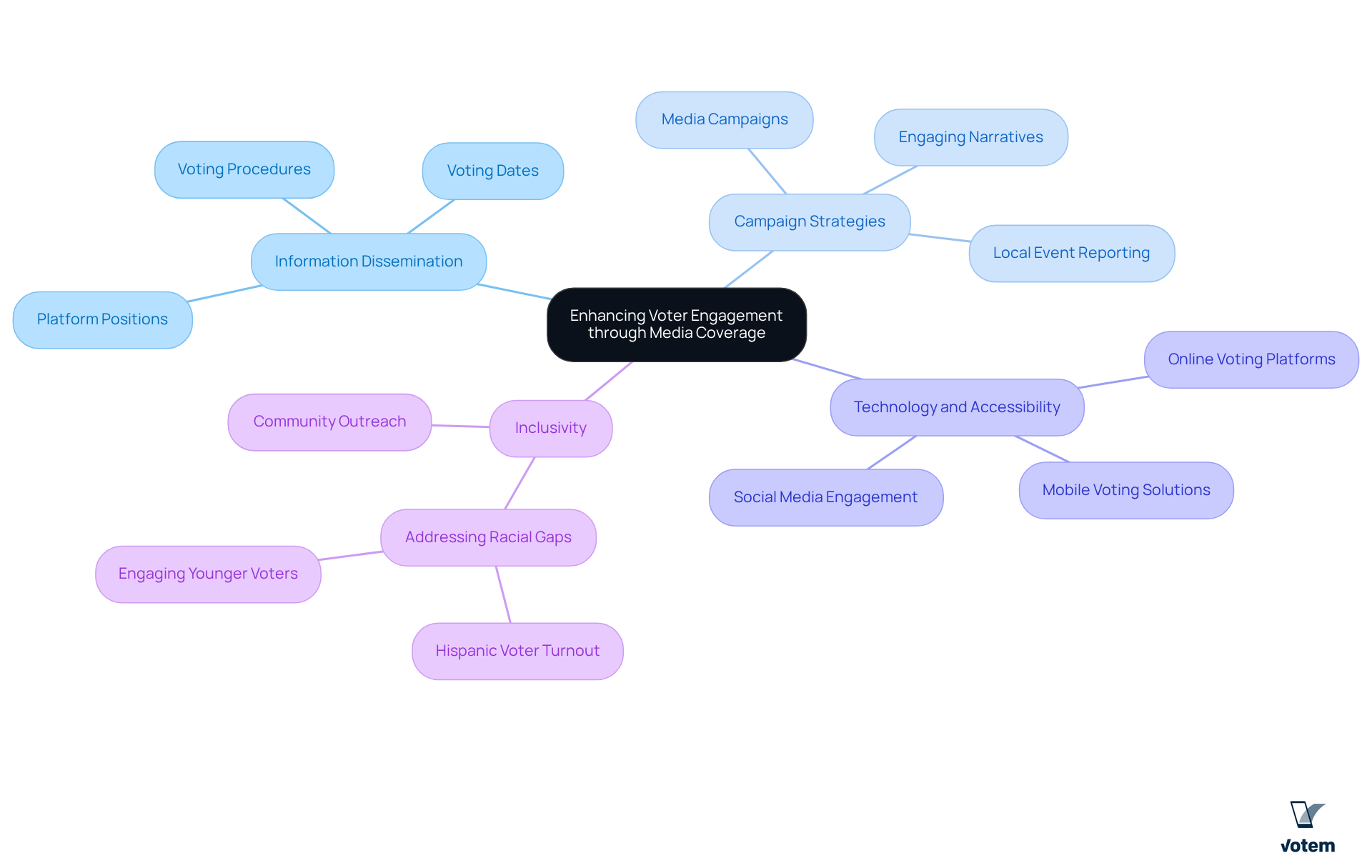Overview
Media coverage plays a pivotal role in government elections and unions, providing essential information that empowers voters to make informed decisions. This not only enhances democratic engagement but also shapes public perceptions and increases voter turnout.
Thorough reporting serves as a vital source of knowledge about candidates and policies, ultimately fostering a more informed and active electorate. In addition, the implications of such coverage extend beyond mere information dissemination; they create a ripple effect that encourages civic participation and accountability.
Introduction
The role of media in shaping public discourse around government elections and unions is paramount. By providing comprehensive coverage, media outlets empower citizens with the knowledge necessary to make informed voting decisions, thus enhancing democratic engagement. This crucial function raises a critical question: how does the media’s portrayal of candidates and issues influence voter behavior and perceptions, particularly in an era where misinformation can spread rapidly? Understanding this dynamic is essential for fostering a well-informed electorate and ensuring that every voice is heard in the democratic process.
Facilitate Informed Voting Through Comprehensive Coverage
Thorough media reporting is essential for enabling educated voting, which raises the question of why it is important to have , as it provides individuals with crucial information about nominees, policies, and electoral procedures. In governmental elections and unions, news organizations serve as the primary source of information, highlighting why it is important to have media coverage of government elections, as they provide insights into candidates’ platforms, their previous performances, and the implications of proposed policies. This coverage is particularly vital in regulated sectors, where individuals may struggle to navigate complex legal frameworks. By presenting facts, analyses, and diverse perspectives, news coverage empowers citizens to critically evaluate their choices, fostering a more informed electorate.
For instance, during union votes, detailed reporting on candidates’ positions regarding labor rights can significantly influence decision-making, ultimately shaping the leadership and direction of the union. Furthermore, extensive press coverage highlights why it is important to have media coverage of government elections, as it is not merely educational but also a fundamental component of a functioning democracy that enables citizens to make choices that resonate with their values and interests. Recognizing the importance of this media landscape is imperative for union leadership, as it directly impacts the effectiveness of their electoral processes and the empowerment of their members.

Shape Public Perception of Candidates and Issues
The impact of media coverage on public perceptions of individuals and issues highlights why it is important to have media coverage of government elections, as it often determines the narrative that surrounds a vote. By employing selective reporting, framing, and emphasizing specific topics, media outlets shape how voters view candidates’ qualifications, integrity, and alignment with public interests. For example, during voting periods, candidates receiving extensive positive attention are often regarded more favorably. Conversely, those subjected to unfavorable reporting may struggle to garner support. This dynamic is particularly significant in union elections, where candidates’ stances on labor rights and worker advocacy can be pivotal.
Furthermore, media narratives raise the issue of why it is important to have media coverage of government elections, as they can either bolster or undermine candidates’ credibility, directly impacting public trust and engagement. The representation of critical issues—such as healthcare, education, and labor rights—also plays a crucial role in swaying public sentiment and rallying citizens around specific causes. Consequently, the press’s role in shaping viewpoints extends beyond merely conveying information, highlighting why it is important to have media coverage of government elections as it fundamentally influences the core of electoral discourse.
In light of this, union leadership must recognize the power of media narratives and actively engage with the press to ensure that their perspectives on labor rights and worker advocacy are accurately represented. This proactive approach not only but also fosters public trust and engagement in the electoral process.

Enhance Voter Engagement and Turnout
Media coverage plays a crucial role in boosting participation and turnout, leading us to ask why is it important to have media coverage of government elections? By supplying prompt details regarding voting dates, procedures, and platform positions, news outlets can encourage voters to engage actively in the electoral process, illustrating why it is important to have media coverage of government elections. Captivating narratives, discussions with applicants, and reporting on local events generate a sense of urgency and significance regarding polls, illustrating why it is important to have media coverage of government elections to motivate individuals to submit their votes.
For instance, during union votes, media campaigns that emphasize the stakes involved—such as collective bargaining rights or workplace conditions—can significantly motivate union members to engage in the voting process. Furthermore, Votem’s adaptable online voting platform accommodates various election types and voting methods, guaranteeing that all participants, including citizens and election organizations, have access to clear and confirmable processes. This commitment to accessibility and security enhances public trust, particularly in a landscape where are increasingly vital.
Moreover, social networking sites have emerged as influential instruments for citizen engagement, enabling real-time communication and mobilization initiatives. By utilizing these platforms, media can connect with younger groups, who often participate less in elections, and those who might feel excluded, ultimately aiding in increased electoral participation. Addressing racial gaps in electoral participation, particularly the lower rates among Hispanic participants during midterm elections, is crucial for fostering inclusivity in the electoral process.
Therefore, the press’s capacity to involve and educate the electorate, along with Votem’s innovative solutions, highlights why it is important to have media coverage of government elections for promoting a vibrant democratic process. Effective media strategies, alongside reliable electoral processes provided by partners like Votem, are vital for enhancing voter participation and ensuring that all voices are heard in the democratic process.

Conclusion
Thorough media coverage is indispensable in shaping the landscape of government elections and unions, empowering citizens with the knowledge necessary for making informed decisions. The role of the media transcends mere reporting; it serves as a critical conduit for information about candidates, policies, and electoral processes that ultimately influences voter behavior and engagement. By facilitating access to diverse perspectives and analyses, media coverage fosters a more educated electorate, essential for a robust democratic process.
Key arguments highlight how media influences public perception of candidates and issues, shaping narratives that can significantly impact electoral outcomes. From framing candidates’ qualifications to emphasizing critical issues such as labor rights and healthcare, the media’s portrayal can either enhance or diminish public trust. Furthermore, the ability of media to drive voter engagement and turnout cannot be overstated. By providing timely information and creating a sense of urgency around elections, media outlets motivate citizens to participate actively in the democratic process.
Recognizing the importance of comprehensive media coverage is vital for both voters and union leadership. It is essential to advocate for accurate representation and engage with media narratives to ensure that all voices are heard. As the landscape of electoral participation continues to evolve, leveraging innovative media strategies will be crucial in enhancing voter engagement and addressing disparities in participation. Ultimately, the call to action is clear: embrace the power of media to strengthen democracy, ensure informed voting, and foster a more inclusive electoral environment.
Frequently Asked Questions
Why is media coverage important for government elections?
Media coverage is essential for government elections as it provides individuals with crucial information about nominees, policies, and electoral procedures, enabling educated voting.
What role do news organizations play in elections?
News organizations serve as the primary source of information during elections, offering insights into candidates’ platforms, their past performances, and the implications of proposed policies.
How does media coverage help in regulated sectors?
In regulated sectors, media coverage is vital as it helps individuals navigate complex legal frameworks by presenting facts, analyses, and diverse perspectives.
What impact does reporting on candidates’ positions have during union votes?
Detailed reporting on candidates’ positions regarding labor rights can significantly influence decision-making during union votes, ultimately shaping the leadership and direction of the union.
How does media coverage contribute to democracy?
Extensive press coverage is a fundamental component of a functioning democracy, enabling citizens to make choices that resonate with their values and interests.
Why should union leadership recognize the importance of media coverage?
Union leadership should recognize the importance of media coverage because it directly impacts the effectiveness of their electoral processes and the empowerment of their members.
List of Sources
- Facilitate Informed Voting Through Comprehensive Coverage
- Jesuit Resource – Election Day Quotes (https://xavier.edu/jesuitresource/online-resources/quote-archive1/election-dayvoting)
- Six ways the media influence elections (https://journalism.uoregon.edu/news/six-ways-media-influences-elections)
- How Media – Namely News, Ads and Social Posts – Can Shape an Election (https://rutgers.edu/news/how-media-namely-news-ads-and-social-posts-can-shape-election)
- Headlines win elections: Mere exposure to fictitious news media alters voting behavior – PMC (https://pmc.ncbi.nlm.nih.gov/articles/PMC10393126)
- How Media Habits Relate to Voter Participation (https://knightfoundation.org/reports/how-media-habits-relate-to-voter-participation)
- Shape Public Perception of Candidates and Issues
- Nine Inspiring Media Quotes: Journalism, Public Relations and Visual Communication | University of Nevada, Reno (https://unr.edu/nevada-today/news/2017/nine-media-quotes-journalism)
- Hundreds of Macalester College Staffers Lock Down Union Election Date – Racket (https://racketmn.com/hundreds-of-macalester-college-staffers-lock-down-union-election-date)
- Six ways the media influence elections (https://journalism.uoregon.edu/news/six-ways-media-influences-elections)
- Enhance Voter Engagement and Turnout
- What every American needs to know about voter turnout Voter turnout: What every American needs to know before the election (https://rochester.edu/newscenter/what-is-voter-turnout-voting-behavior-625262)
- Civic engagement declines when local newspapers shut down (https://journalistsresource.org/politics-and-government/local-newspapers-civic-engagement)
- Jesuit Resource – Election Day Quotes (https://xavier.edu/jesuitresource/online-resources/quote-archive1/election-dayvoting)

